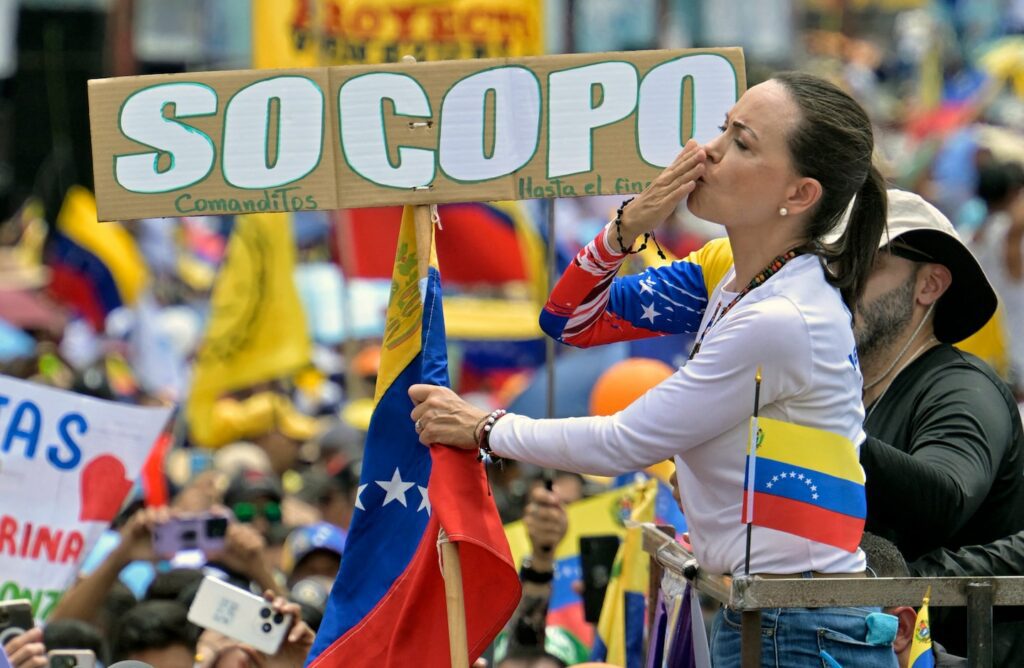After 25 years of politically authoritarian and economically ruinous rule under President Hugo Chávez and his successor, Nicolás Maduro, Venezuela is heading toward a critical July 28 national election. Against all odds, a resurgent opposition could threaten the regime’s hold on power. But it is entirely possible that Mr. Maduro will cling to office through fraud or force. Everything must be done to insure he does not — and that voters make the most of this opportunity to restore freedom and democracy.
Mr. Maduro has spent years trying to destroy the opposition, detaining thousands of activists, journalists and dissidents and subjecting them to beatings, rape, electric shocks, mutilation, asphyxiation and other types of torture. With control of the media, courts, law enforcement and military, Mr. Maduro has blocked many opposition candidates from competing for power. U.S. initiatives to back opposition forces, through pressure and sanctions under President Donald Trump and through negotiations under President Biden, have met with mixed results. Despite sanctions that have hit Venezuela’s crucial oil industry, Mr. Maduro has survived thanks, in part, to backing from Russia, China, Cuba and Iran. Once one of the most prosperous nations of Latin America, Venezuela is now confronting one of the world’s worst humanitarian crises and the flight of more than 7.5 million people since 2015 — including hundreds of thousands to the United States.
Remarkably, after so many years of repression, the opposition is alive and would stand an excellent chance at the ballot box — assuming the election is not stolen. Specious court rulings disqualified the opposition’s charismatic front-running candidate, María Corina Machado but she has remained active on the campaign trail, rallying the democratic Unitary Platform behind a former diplomat, Edmundo González Urrutia. Tumultuous crowds greet them throughout the country, including, on Saturday, in Chavez’s hometown of Barinas. A public-opinion poll taken between May 23 and June 5 showed that two-thirds of voters want a change of government. There is a high level of interest in voting. The survey showed González leading 56 percent to 35 percent among those likeliest to turn out.
For Mr. Maduro a loss would mean not only ouster from office but also the end of the wealth and power that flow from membership in a regime known for spectacular corruption. The same goes for the elite who surround and depend on him for their privileges. At the end of the campaign, he might be tempted to abort the vote through brute force or declare himself the winner when he is not. Either would be disastrous for the Venezuelan people and for an entire hemisphere that badly needs a stable political outcome in this strategic nation. The military and security forces will play a key part; but no one can be sure whether they would defend Mr. Maduro against the people or defect rather than resist overwhelming popular demands for change.
For now, signs point toward hardball from Mr. Maduro. U.N. High Commissioner for Human Rights Volker Türk said he continues to receive “reports of detentions as election day approaches, including of supporters and members of the opposition.” Mr. Türk said his office has documented increased threats, harassment and assaults against civil society participants, journalists, unionists and other regime critics, “including through arrests and prosecutions, and 38 cases of arbitrary detention.” The nongovernmental organization Access to Justice reported in June there have been 46 arbitrary arrests for political reasons so far this year, including 18 members of Ms. Machado’s party. The Maduro-controlled National Electoral Council recently decreed that election observers can only work in the precincts where they vote. Also, on May 29, the election council disinvited the European Union from sending election observers. The United Nations said it was sending a team of four — a pitiful showing. The Carter Center, the nonprofit human rights group established by former president Jimmy Carter that works to promote democracy and resolve conflicts, is also sending a small group of monitors.
Last year, the Biden administration eased some sanctions in exchange for Mr. Maduro’s promise to let the opposition carry out an unfettered campaign. Mr. Maduro has subverted the agreement by arresting members of the opposition and using the courts to block the candidacy of Ms. Machado, and the United States reinstated some sanctions. Absorbed as he is in his own difficult election,and other foreign crises, Mr. Biden doesn’t have much bandwidth left for Venezuela. But he and democraticleaders in Latin America and Europe should pay attention and speak out for a free and fair vote. This might be Venezuela’s last, and best, chance to end a generation of misrule.
Source link : https://www.washingtonpost.com/opinions/2024/07/10/venezuela-opposition-resurgent/
Author :
Publish date : 2024-07-10 15:39:20
Copyright for syndicated content belongs to the linked Source.
